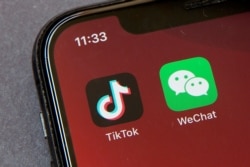These are nail-biting days for the millions of people in the U.S. who use TikTok, the wildly popular video sharing app owned by a Chinese firm.
The stakes are high.
The U.S. government, citing national security concerns, has given the firm until Sept. 15 to sell itself or leave the country.
ByteDance, the Chinese firm that owns TikTok, is reportedly talking to several potential buyers including Microsoft and Walmart, which have joined forces to possibly make a bid, as well as Oracle.
And the Chinese government has changed its export rules about what parts of the firm’s technology can be included in the deal to exclude the app’s powerful recommendation algorithm. It powers the “For You” feature in the app that suggests what short video a user would like to see next.
Whatever happens, the imminent fate of TikTok stands out as a key moment in the Trump administration's efforts to shield the U.S. from China’s reach, observers say.
Trust declining
“When it comes to trade and use of personal data, you need to trust the other party,” said Scott Kennedy, a senior adviser and Trustee Chair in Chinese Business and Economics at the Center for Strategic and International Studies (CSIS). “The rising demands for trust are rising right when trust between the U.S. and China is falling.”
While TikTok may be the most high-profile firm caught in the battle between the two superpowers, it is not the first.
In 2018, the U.S. government blocked a subsidiary of the Chinese tech giant Alibaba from buying MoneyGram over data privacy concerns. The following year, the U.S. forced the Chinese owner of Grindr, the dating app, to give up its control of the company.
Last month, President Donald Trump, citing concerns that TikTok “may also be used for disinformation campaigns that benefit the Chinese Communist Party,” issued an executive order banning U.S. transactions with Chinese firms ByteDance and Tencent, the owner of WeChat, the messaging app.
Trump followed up with a second executive order saying that ByteDance had to divest itself from its ownership of Musical.ly, a video app that it bought in 2017.
‘Clean Network’ vision
The administration’s efforts to block Chinese technology appear to be accelerating in recent months.
In August, Secretary of State Mike Pompeo announced an expansion of the “Clean Network” policy that calls for, among other things, apps made in China to not be available in U.S. stores. The goal is to guard “our citizens’ privacy and our companies’ most sensitive information from aggressive intrusions by malign actors, such as the Chinese Communist Party (CCP),” according to the press release.
For its part, ByteDance has denied accusations it would share data with China, saying its U.S. users’ data is stored in the U.S. and its data centers are outside of China.
ByteDance is reportedly entertained potential buyers, asking for $30 billion.
Interested buyers are exploring four possible ways to structure a deal, according to a Reuters article, including buying the app without the key software or seeking a transition period from U.S. officials.
But the possibility of a deal was muddied with China’s recent update of its export control list to include more technologies, including TikTok’s recommendation algorithm.
Other U.S. companies may be drawn into the battle as it escalates. China’s new export regulations, which includes artificial intelligence, 3-D printing technology and aerial drone technology, may affect how researchers and firms in each country collaborate, said Heather Evans, director of frontier technology research at the Asia Society of Northern California.
“We are seeing how tech companies in the U.S. and in China need to now play a diplomatic role,” she said.
It’s unclear if the TikTok ban goes through on Sept. 15 if current users will still be able to use the app. Most likely, observers say, Apple’s App Store and Google Play, the store for Android phones, will stop offering the app.






